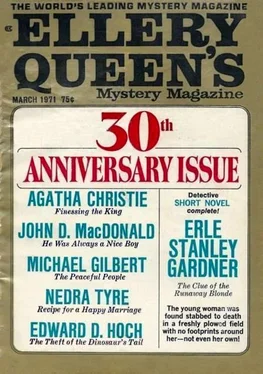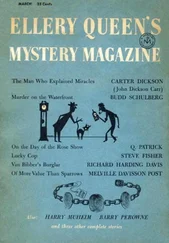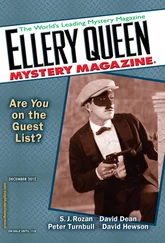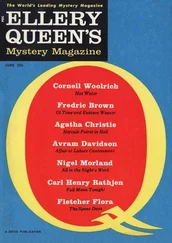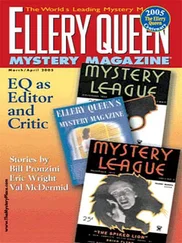Jon Breen - Ellery Queen’s Mystery Magazine, Vol. 57, No. 3. Whole No. 328, March 1971
Здесь есть возможность читать онлайн «Jon Breen - Ellery Queen’s Mystery Magazine, Vol. 57, No. 3. Whole No. 328, March 1971» весь текст электронной книги совершенно бесплатно (целиком полную версию без сокращений). В некоторых случаях можно слушать аудио, скачать через торрент в формате fb2 и присутствует краткое содержание. Город: New York, Год выпуска: 1971, Издательство: Davis Publications, Жанр: Классический детектив, на английском языке. Описание произведения, (предисловие) а так же отзывы посетителей доступны на портале библиотеки ЛибКат.
- Название:Ellery Queen’s Mystery Magazine, Vol. 57, No. 3. Whole No. 328, March 1971
- Автор:
- Издательство:Davis Publications
- Жанр:
- Год:1971
- Город:New York
- ISBN:нет данных
- Рейтинг книги:3 / 5. Голосов: 1
-
Избранное:Добавить в избранное
- Отзывы:
-
Ваша оценка:
- 60
- 1
- 2
- 3
- 4
- 5
Ellery Queen’s Mystery Magazine, Vol. 57, No. 3. Whole No. 328, March 1971: краткое содержание, описание и аннотация
Предлагаем к чтению аннотацию, описание, краткое содержание или предисловие (зависит от того, что написал сам автор книги «Ellery Queen’s Mystery Magazine, Vol. 57, No. 3. Whole No. 328, March 1971»). Если вы не нашли необходимую информацию о книге — напишите в комментариях, мы постараемся отыскать её.
Ellery Queen’s Mystery Magazine, Vol. 57, No. 3. Whole No. 328, March 1971 — читать онлайн бесплатно полную книгу (весь текст) целиком
Ниже представлен текст книги, разбитый по страницам. Система сохранения места последней прочитанной страницы, позволяет с удобством читать онлайн бесплатно книгу «Ellery Queen’s Mystery Magazine, Vol. 57, No. 3. Whole No. 328, March 1971», без необходимости каждый раз заново искать на чём Вы остановились. Поставьте закладку, и сможете в любой момент перейти на страницу, на которой закончили чтение.
Интервал:
Закладка:
“But antique jewelry is my great weakness,” said Tabarin, revealing the wall safe behind the Marbeuf. “Usually I keep my collection at the shop. My insurance company prefers it that way.” Tabarin drew out a box containing a pendant, broach, and signet ring. “But now and then, much to their dismay, I bring a few pieces home to enjoy them at my leisure.”
Tabarin waited. What could be more natural than for the Count to mention his antique diamond necklace? When he did not, the jeweler had to snap his fingers. “Ah,” he exclaimed, “I knew I had seen you some place before. Last night at the Opera. As I recall, your wife was wearing a rather unusual antique necklace.”
“The necklace is beautiful, isn’t it?” de Gobineau said a bit sadly. “The last of our family heirlooms.”
“I suppose you’ve had it appraised?” asked Tabarin in an off-hand way.
The Count sighed. “Pointless,” he said. “Regretfully I can never sell it.”
“Because it’s encumbered in some way?” asked Tabarin, straining to keep the apprehension out of his voice.
The Count shook his head. “Because of the family legend,” he said. “The Gobineau necklace was lost at sea during the Eighth Crusade, stolen by marauding Yorkshiremen during the Hundred Years War, sold to pay off creditors under the Sun King, and so on and so on. But always it came back to us. Always. For example, the family fled to Russia during the French Revolution, but not before a local Jacobin leader had confiscated the necklace in the name of the Republic. This Jacobin later fled the Girondists across the Rhine and into the Duchy of Altdorf where he was promptly executed as a spy and the necklace was added to the Duke’s treasury. It was later returned to France as part of German reparations following the Battle of Jena. Seven years later in Odessa my great-great-grandfather won the necklace at cards from a Cossack officer who claimed to have found it in baggage abandoned by Napoleon in his retreat from Moscow. So you see, knowing that the necklace must come back to me, how could I in good conscience sell it?”
“Not even for a million francs?” said Tabarin flatly.
The Count smiled. “I’m sorry,” he said.
Tabarin didn’t press the point. Nor did he give up. He was reminded of the Baron Haegg who had an ancient emerald clasp he refused to sell. After all, it had been in his family for generations. And the Baron’s income was adequate for a sensible, temperate man. Which was what Haegg had been, until Tabarin introduced him to the voluptuous Magda Schmettering, sometime model, sometime movie starlet. Well, the bounteous Magda would be wasted on the Count. But there were other ways.
Later when the other guests were taking their leave, Tabarin drew the Count aside. Protesting that the evening was still young, he invited the Count and his wife to the Casino.
The Count raised an eyebrow. “We never never gamble,” he said.
“I’d hardly expect my guests to risk their own money,” laughed Tabarin. “I, of course, will provide the stakes. You might find it interesting.”
The Count weighed the invitation thoughtfully. “Perhaps I would,” he agreed.
Three days later Tabarin was offering the Count a chair in his office. “And how is your charming wife?” he asked.
The Count leaned forward with a conspiratorial smile. “I’m afraid she half suspects the reason for my visit,” he said. “She’s waiting for me in your showroom.”
“Then this isn’t a social call?” said Tabarin smoothly.
The Count was carrying his plastic raincoat over one arm. He drew a green leather box from the pocket and set it on Tabarin’s desk. The jeweler examined the necklace carefully with his loupe, pretending to see it for the first time, impressed once more by its dazzling beauty. “I assume you’ve reconsidered selling,” he said.
“No,” said the Count. “I’ve already explained why that is impossible.” He cleared his throat. “First, Mr. Tabarin, let me thank you for introducing me to the first great passion of my life. Some men are lucky at roulette; others are not. I’ve discovered that I am one of the lucky ones.”
“Then you’ve been winning at the Casino?” asked Tabarin uneasily.
The Count smiled broadly and nodded. “That is, until yesterday when I encountered a losing streak. Quite temporary, of course. But I’ve exhausted all my available funds.”
“I see,” said Tabarin, relieved.
“I knew you’d understand,” said the Count. “So I would like to borrow one hundred thousand francs from you, using the necklace as security. And with the stipulation that I will forfeit the necklace if I cannot repay the money by the end of the month.”
Tabarin couldn’t believe his ears.
The Count nodded emphatically. “Yes,” he said, “why shouldn’t I force my luck a bit? Since I can’t really lose the necklace — I explained our family legend, didn’t I? — then by gambling with money borrowed on it I’m bound to win.” He smiled at his own clever logic and tapped his temple.
For a brief moment Tabarin pitied the Count. But a fool had no right to such a magnificent necklace. He quickly drew up their agreement in the form of a receipt for the diamonds and was just about to write out the check when his secretary came to the door. She said the Countess wanted to speak to her husband. In fact, the Countess was right behind her, craning to look into the office.
Tabarin quickly snapped the green leather lid over the necklace. In the next moment the Count was on his feet and had dropped his raincoat over the box. “What is it, Florence?” he said sharply.
“Alfred,” said the Countess, “the salespeople have shown me so many expensive things. I’m sure they expect me to buy something.”
“In a moment, my dear,” said the Count.
Tabarin’s secretary closed the door, but not before she reminded him he was late for an appointment. He made out the check and handed it to the Count, who had picked up his raincoat. “If you hurry you can still make the bank before it closes,” the jeweler said. “In fact, it’s on my way. Let me drop you there.”
With a final admiring glance at the necklace Tabarin left it with his secretary, instructing her to place it in the vault.
That evening there was the opening of a new art gallery on the rue de Begat. Afterward Tabarin dined with a group of friends at a Tripolitanian restaurant of which San Sebastiano had several, all throwbacks to its Nineteenth Century fling at empire in North Africa. It was someone else at the table who suggested a visit to the Casino.
So they arrived, a handsome, laughing group. To Tabarin’s surprise the Count was not there. Surely he hadn’t lost the money that quickly. Gautier, the steward, shrugged. He hadn’t seen the Count all day. Tabarin frowned. Had the Count abandoned his crazy scheme?
There was no way out of it, Tabarin had to call the Hotel Sébastopol. The concierge informed him that the Count and Countess had checked out late that afternoon, leaving no forwarding address.
“Have you taken ill, sir?” asked Gautier, as Tabarin put down the receiver.
Each time the night watchman limped by the office doorway on his rounds he shook his head at the sight of Tabarin, jaw clenched, staring down at a necklace on his desk. The necklace was a fake. The Count had pulled a switch, probably when his wife had come to the door. The money wasn’t important. The fact that the little con man had taken him wasn’t important. But Tabarin was desperate to have the real necklace back. And by the first light of day a plan had taken shape in his mind.
Not far from the Marche St. Nicholas or Thieves Market was the Café Dureville, the dismal habitat of sleepy night people squinting against the early morning sun. Sitting in the comer was Babar the Elegant, a third-rate burglar and safecracker with a weakness for shot-silk suits, flowered shirts, and silver ties. Babar had a head cold. He hunched his broad shoulders over a glass of hot grog, inhaled the fumes deeply and said, “In deals to defraud the insurance boys the customary split is fifty-fifty.”
Читать дальшеИнтервал:
Закладка:
Похожие книги на «Ellery Queen’s Mystery Magazine, Vol. 57, No. 3. Whole No. 328, March 1971»
Представляем Вашему вниманию похожие книги на «Ellery Queen’s Mystery Magazine, Vol. 57, No. 3. Whole No. 328, March 1971» списком для выбора. Мы отобрали схожую по названию и смыслу литературу в надежде предоставить читателям больше вариантов отыскать новые, интересные, ещё непрочитанные произведения.
Обсуждение, отзывы о книге «Ellery Queen’s Mystery Magazine, Vol. 57, No. 3. Whole No. 328, March 1971» и просто собственные мнения читателей. Оставьте ваши комментарии, напишите, что Вы думаете о произведении, его смысле или главных героях. Укажите что конкретно понравилось, а что нет, и почему Вы так считаете.
